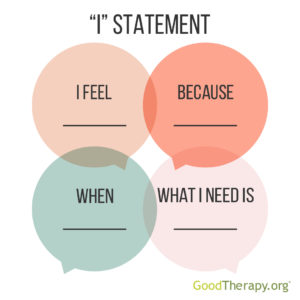Contents
When we are dissatisfied with someone’s behavior, the first thing we want to do is bring down all our indignation on the “guilty” one. We begin to accuse the other of all the sins, and the scandal enters a new round. Psychologists say that the so-called “I-messages” will help us correctly express our point of view and not offend the interlocutor in such disputes. What it is?
“Again you forgot about your promise”, “You are always late”, “You are an egoist, you constantly do only what you want” — we had to not only say such phrases ourselves, but also hear them addressed to us.
When something does not go according to our plan, and the other person does not behave the way we would like, it seems to us that by blaming and pointing out shortcomings, we will call him to conscience and he will immediately correct himself. But it doesn’t work.
If we use «You-messages» — we shift the responsibility for our emotions to the interlocutor — he naturally begins to defend himself. He has a strong feeling that he is being attacked.
You can show the interlocutor that you take responsibility for your feelings.
As a result, he himself goes on the attack, and a squabble begins, which can develop into a conflict, and possibly even a break in relations. However, such consequences can be avoided if we move from this communication strategy to «I-messages».
With the help of this technique, you can show the interlocutor that you take responsibility for your feelings, and also that it is not he himself who is the cause of your concern, but only some certain of his actions. This approach significantly increases the chances for a constructive dialogue.
I-messages are built according to four rules:
1. Talk about feelings
First of all, it is necessary to indicate to the interlocutor what emotions we are experiencing at the moment, which violates our inner peace. These can be such phrases as “I am upset”, “I am worried”, “I am upset”, “I am worried”.
2. Reporting the facts
Then we report the fact that influenced our condition. It is important to be as objective as possible and not judge human actions. We simply describe what exactly led to the consequences in the form of a fallen mood.
Note that even starting with the “I-message”, at this stage we often move to the “You-message”. It might look like this: «I’m annoyed because you never show up on time,» I’m angry because you’re always a mess.
To avoid this, it is better to use impersonal sentences, indefinite pronouns and generalizations. For example, «I get upset when they are late», «I feel bad when the room is dirty.»
3. We give an explanation
Then we need to try to explain why we are offended by this or that act. Thus, our claim will not look unfounded.
So, if he is late, you can say: «…because I have to stand alone and freeze» or «…because I have little time, and I would like to stay longer with you.»
4. We express desire
In conclusion, we must tell what behavior of the opponent we consider preferable. Let’s say: «I would like to be warned when I’m late.» As a result, instead of the phrase “You are late again,” we get: “I worry when my friends are late, because it seems to me that something happened to them. I’d like to be called if I’m late.»
Of course, «I-messages» may not immediately become a part of your life. It takes time to change from a habitual strategy of behavior to a new one. Nevertheless, it is worth continuing to resort to this technique every time conflict situations occur.
With its help, you can significantly improve relationships with a partner, as well as learn to understand that our emotions are only our responsibility.
An exercise
Recall a situation in which you complained. What words did you use? What was the outcome of the conversation? Was it possible to come to an understanding or a quarrel broke out? Then consider how you could change the You-messages to I-messages in this conversation.
It may be difficult to find the right language, but try to find phrases that you can use to communicate your feelings without blaming your partner.
Imagine the interlocutor in front of you, enter the role and say the formulated «I-messages» in a soft, calm tone. Analyze your own feelings. And then try to practice the skill in real life.
You will see that your conversations will increasingly end in a constructive way, leaving no chance for resentment to harm your emotional state and relationships.










